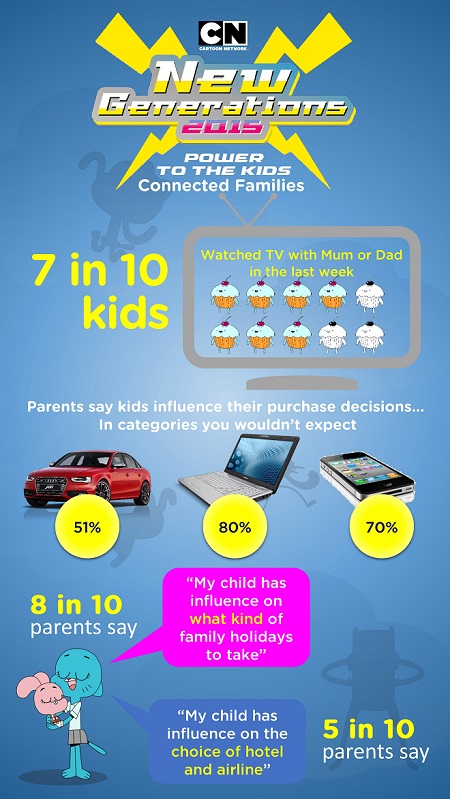
Hong Kong – Kids in Southeast Asia have greater online access through mobile and tablet devices than ever before, but television remains the most popular media, research study from Turner Asia Pacific has revealed.
The New Generations survey – commissioned by the media company known for its kids’ brands Cartoon Network, Boomerang and Toonami – analyses the behaviour and spending power of the region’s youngest consumers. Findings from the 2015 edition shows that affluent boys and girls, aged 4-14, are increasingly taking control when it comes to how they access the internet and asserting influence on household purchases.
A multi-screen content experience continues to be key in the world of the junior consumer. TV continues to be a lead medium for the surveyed kids (92% watched TV in the last month) followed very closely by digital platforms (89%).
“Asia’s youngest consumers are avid users of television and digital media. With considerable spending power as well as significant purchasing influence over parents, they can’t afford to be ignored,” said David Webb, Director of Research and Planning at Turner International Asia Pacific.
Outside of their friendship group, TV and online are also the most important media when it comes to how they find out about new things that appeal to them. And kids are continuing to watch TV alongside their parents with seven in 10 regularly viewing movies, cartoons and comedy programmes together most weeks.
“The majority of kids spend time co-viewing with the household purchasing decision maker, which means TV is still the most effective advertising medium for reaching this important audience,” continued Mr Webb.
As well as categories that you’d expect – such as toys and sweets – New Generations discovered that kids have a substantial influence on purchase decisions made for a wider array of categories than are expected including holiday destinations (including choice of hotels and airlines), household products, smart phones and gadgets, personal care, and even cars.
Of all the Southeast Asian households surveyed, 94% now have a smart phone with 76% of kids having access to or own their own device. Interestingly, kids are now using apps
more often than the internet with 86% using an app at least weekly, accessing at least five apps per month, and spending 34% more time on apps compared with a year ago.
Parents obviously agree in app-importance and that they can enhance the TV watching experience, and actively download apps for their kids. While social networking is the number one leisure activity, parents are also paying on average US$10 every month for app downloads.
“These children are digital natives, and as tablet and mobile devices continue to proliferate homes, the way they access entertainment and games continues to evolve. We’ve seen a significant shift in the amount of time spent watching online videos because of this, but playing games and the use of apps is still how kids choose to spend the majority of their online leisure time and there’s no indication that this trend will change,” added Mr Webb.
Turner’s New Generations report evaluated more than 1,500 online responses from child-and-parent pairs from affluent households in Manila, Singapore and Jakarta.








